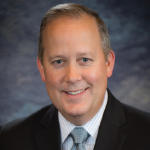TR: What inspired you to pursue this opportunity at the ACR at this point in your career?
SE: The size and scope of the ACR as an organization was one important factor. In many ways, the ACR is leading the way in medical associations. It is a very complex organization with many noteworthy initiatives. It also has a long history of success. I have found that whenever the ACR wanted to accomplish anything, no matter what goals its leadership set its mind to, it has accomplished it. Right now, the ACR’s registry [Rheumatology Informatics System for Effectiveness (RISE)] and other innovative approaches to education are very exciting to me, and I am proud to be part of this dynamic organization.
One major strength of the ACR is the unity within the field and the organization. Although people may agree or disagree, they serve together in unity and purpose, which builds loyalty within the organization. This makes the ACR a more successful and influential organization when it approaches other organizations and tries to build partnerships and coalitions. It has more clout. I want to help ACR leaders maintain that unity and build on it.
TR: What are some of your initial goals and your long-term vision for the growth of the ACR and ARP, including quality, medical education and advocacy?
SE: I think leadership can continue to build on the ACR’s strengths, especially in the quality and outcomes areas. The ACR has been a leader in the development of practice guidelines and practice measures, and is also leading the way with the registry, as I mentioned. RISE allows us to provide robust, accessible clinical data that can be used to answer relevant clinical questions in rheumatology. I would like to see increases in the projects commissioned and the number of publications based on that data.
When it comes to education, the ACR has an opportunity to examine its structure to increase learning opportunities. The ACR already has great online learning programs, including the new ACR Beyond, which provides online access to innovative educational content. There are multiple organizations vying for our members’ interest in this area. We have an opportunity to expand what we offer in education or even partner with other groups.
The ACR’s unity gives it power to influence other organizations when we partner with them. We can learn so much from increased collaboration with other medical societies and provider coalitions, and more networking within the medical society community. I think the ACR can thoughtfully consider increasing programs and volunteer opportunities in all areas of membership, which would satisfy the desire for connections and leadership development. These programs and events could position the ACR as a major contributor on issues around access to care, maintenance of certification, and other key areas.



